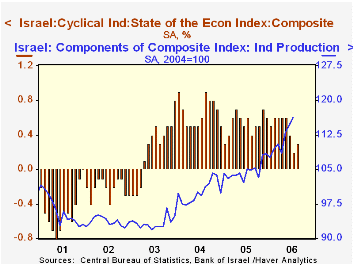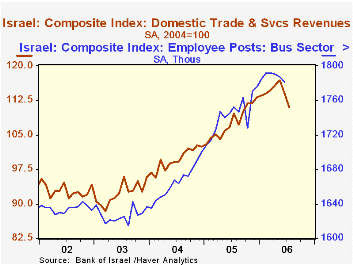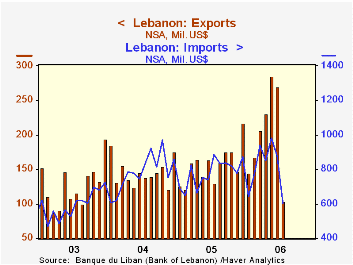 Global| Sep 21 2006
Global| Sep 21 2006Israel's Economy Sees Slower Growth in the Face of War in Lebanon; Lebanon's Economy Falls Dramatically
Summary
The Israel's Central Statistics Bureau today reported its "State of the Economy Index" for August, along with its available components. When we last checked in on the Israeli economy, about six weeks ago, the war in Lebanon was still [...]

The Israel's Central Statistics Bureau today reported its "State of the Economy Index" for August, along with its available components. When we last checked in on the Israeli economy, about six weeks ago, the war in Lebanon was still in full swing and in describing Q2 GDP, we wondered out loud what the war would do to the economy in Q3. Today's report gives a bit of an indication. The overall index is estimated to have risen 0.3% in each July and August, marginally less than June's 0.4%, but noticeably less than the 0.6%/month in each of the prior four months. So some slowdown is clearly in process.
The index has five components covering industry, domestic and foreign trade and employment in the business sector (about 70% of total employment). Only exports and imports are published yet for August, and both of these are more than keeping up with their average of the past year. Imports grew 5.2% in August compared with a 12-month average gain of 1.4% and exports were up 3.5% versus an average of 1.1%. Industrial production through July was continuing with some strength as well, with monthly increases well over 1% then and in June, compared with 0.9% monthly for the last 12 months.
The slowing is more evident in demand and employment indicators. The employment data lag, with the latest values only covering June and a detailed industrial breakdown only through Q2. But business sector employment by this monthly indicator peaked in March and fell slightly in each of the following months. Since this information is all prior to the Lebanon war, there is no impact evident here. Further, employment had expanded with some vigor since early in 2004. So perhaps there is nothing more in the recent pattern than a pause after a strong uptrend.
Domestic sales, however, seem to be a different story. Revenues from trade and services dropped 2.5% in June and another 2.6% in July, erasing almost all of a nice rise over the nine months beginning last September. People could well hold back purchases or at least take a cautionary stance as political tensions mount. Fortuitously for their welfare, a truce was called quickly, and this likely helps the general economy as well.
In dramatic contrast, the impact of the war showed quickly and distinctly in Lebanon. Data offerings are fairly sparse, but a quick look at imports and exports, which were reported Monday by the Bank of Lebanon, shows a clear picture of significant economic damage. The third graph here tells the whole story.
| Israel: SA, % Chg | Weight (%) | Aug 2006 | July 2006 | June 2006 | Yr Ago (Mo. Avg) | Yearly % Change|||
|---|---|---|---|---|---|---|---|---|
| 2005 | 2004 | 2003 | ||||||
| Total Index | 100 | 0.3 | 0.3 | 0.4 | 0.5 | 7.1 | 6.9 | -0.7 |
| Industrial Production | 28 | -- | 1.3 | 1.6 | 0.9 | 4.6 | 7.2 | -0.3 |
| Imports | 15 | 5.2 | 2.4 | -2.3 | 1.4 | 2.3 | 14.6 | -4.8 |
| Trade & Services Revenues | 28 | -- | -2.6 | -2.5 | 0.1 | 8.1 | 8.0 | -0.6 |
| Employees in Business Sector | 19 | -- | -- | -0.3 | 0.2 | 4.7 | 2.4 | -0.5 |
| Exports | 10 | 3.5 | -10.2 | 9.4 | 1.1 | 7.1 | 17.4 | 4.4 |
Carol Stone, CBE
AuthorMore in Author Profile »Carol Stone, CBE came to Haver Analytics in 2003 following more than 35 years as a financial market economist at major Wall Street financial institutions, most especially Merrill Lynch and Nomura Securities. She had broad experience in analysis and forecasting of flow-of-funds accounts, the federal budget and Federal Reserve operations. At Nomura Securities, among other duties, she developed various indicator forecasting tools and edited a daily global publication produced in London and New York for readers in Tokyo. At Haver Analytics, Carol was a member of the Research Department, aiding database managers with research and documentation efforts, as well as posting commentary on select economic reports. In addition, she conducted Ways-of-the-World, a blog on economic issues for an Episcopal-Church-affiliated website, The Geranium Farm. During her career, Carol served as an officer of the Money Marketeers and the Downtown Economists Club. She had a PhD from NYU's Stern School of Business. She lived in Brooklyn, New York, and had a weekend home on Long Island.
More Economy in Brief
 Global| Feb 05 2026
Global| Feb 05 2026Charts of the Week: Balanced Policy, Resilient Data and AI Narratives
by:Andrew Cates





